It was a rainy day—one of many in a long stretch of rainy days—when I arrived in Jiufen. The steady downpour from the dense grey clouds seemed to have drained the color from this mountain village, nestled in the hills near the sea. Although it was only noon, it felt as if the sun had already set. Still, the gloomy weather didn’t discourage the many visitors wandering through Jiufen that day, dressed in plastic ponchos and transparent raincoats.
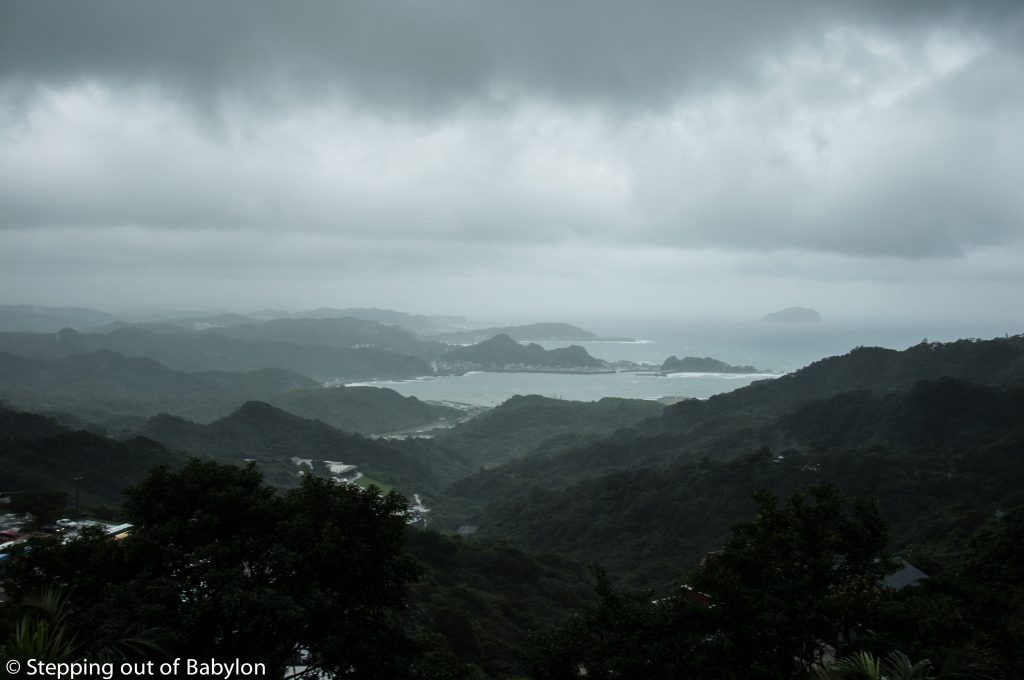
Jiufen is an old mining town that saw its heyday during the Japanese occupation of Taiwan. Located about an hour by bus from Taipei, it has become a very popular day-trip destination for both locals and tourists. Visitors pour in daily throughout the year, often in large groups, drawn by the picturesque charm of the narrow streets winding up the hillside, lined with quaint buildings and traditional Chinese teahouses.
Most of the shops and restaurants are concentrated along the main road, commonly known as “Jiufen Old Street.” This area is heavily geared toward tourism, filled with souvenir and craft shops, as well as street food stalls that flood the narrow lanes with delicious aromas.
One of the most curious aspects of Jiufen is the fame it gained after a film was shot there in the 1980s. The movie “City of Sadness” helped transform a semi-abandoned village into a cultural icon. It brought renewed attention to the lingering Japanese influence and helped revive the traditional Chinese teahouse culture, imbuing the town with a nostalgic charm that still draws crowds today. But this small village is also often associated with Hayao Miyazaki’s animated film “Spirited Away”, with many people believing it inspired the movie’s setting. Althougt Miyazaki himself has stated he has never visited this place and the film was not based in Jiufen or any single location, it’s easy to find merchandise and souvenirs related to the movie there
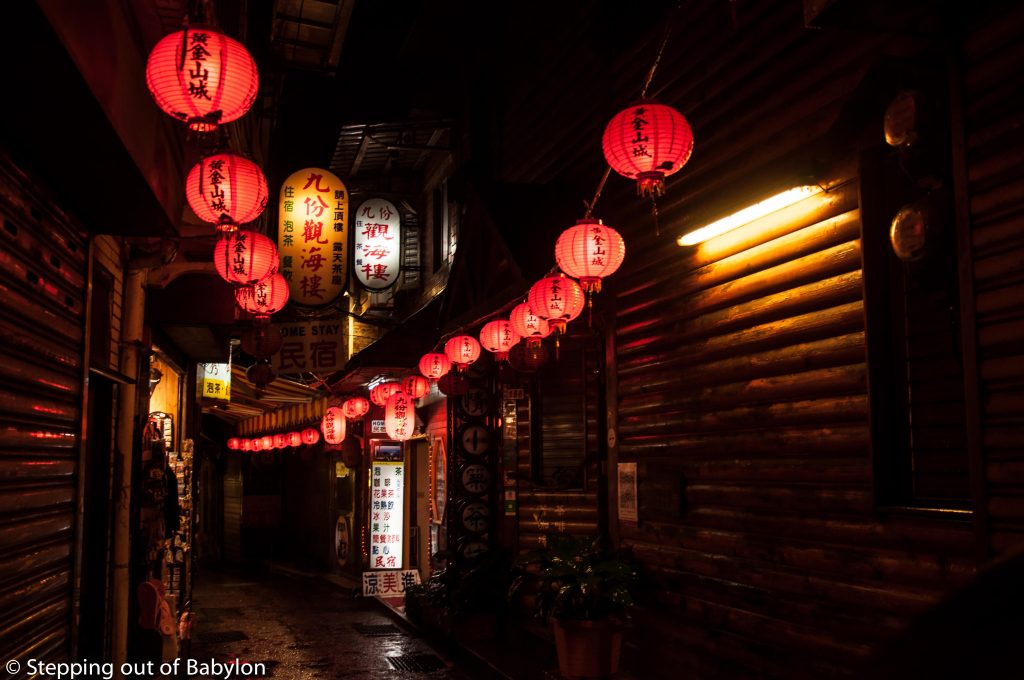
If you have time, it’s worth staying overnight in Jiufen to experience the village without the overwhelming daytime crowds. During the day, the narrow streets become difficult to navigate, packed with people and selfie sticks, testing the patience of even the most relaxed travellers.
I must admit, Jiufen didn’t especially impress me. While it’s not an unpleasant place—if you can overlook the crowds, the constant photo-taking, and the rushed atmosphere of tourists trying to catch their buses—it feels somewhat artificial. The village seems to try too hard to be picturesque, promoting food traditions that feel more modern than historic, and romanticizing a past that holds limited cultural depth. Jiufen is like a postcard: visually charming and perfect for photos, but lacking genuine authenticity.
Nearby Shifen is another similar town, but the ongoing bad weather made it uninviting to explore further. So, I hurried south, hoping to escape the rain that so often lingers in northern Taiwan during the winter.
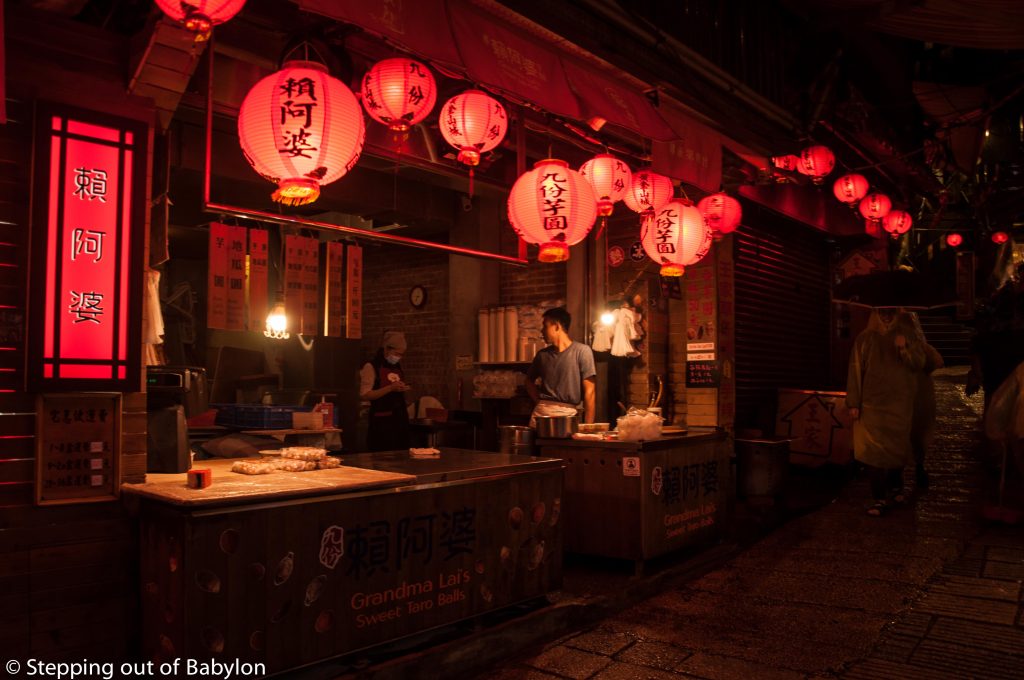
Teahouse Experience in Jiufen
A-Mei is the most popular of Jiufen’s teahouses, offering a lovely sea view, but there are at least seven others where visitors can enjoy a traditional tea ceremony. Tea is prepared according to ancient rituals and served in miniature cups, often accompanied by a selection of local sweets.
A kettle is kept boiling next to your table, and after a quick explanation from the staff on how to prepare the tea, you’re left to perform the ritual at your own pace. You start by warming the teapot and cups, then pour the boiling water over the tea leaves—once to “open” them and subsequent times to infuse the flavour. The result is a subtle, delicate brew that encourages you to slow down, sip mindfully, and take in the atmosphere.
The experience is enhanced by the décor, full of classic Chinese motifs and antiques, creating a nostalgic and almost cinematic setting. You can enjoy the sweets that come with the tea and refill the pot as many times as you like.
I visited in the morning, when the teahouse was nearly empty. But later in the day, as tour groups arrive, you should expect a wait—especially if you’re hoping for a seat on the balcony.
The basic tea set costs around NT$300 per person, making it the most expensive tourist activity I did during my two-week trip in Taiwan—but it was certainly memorable.
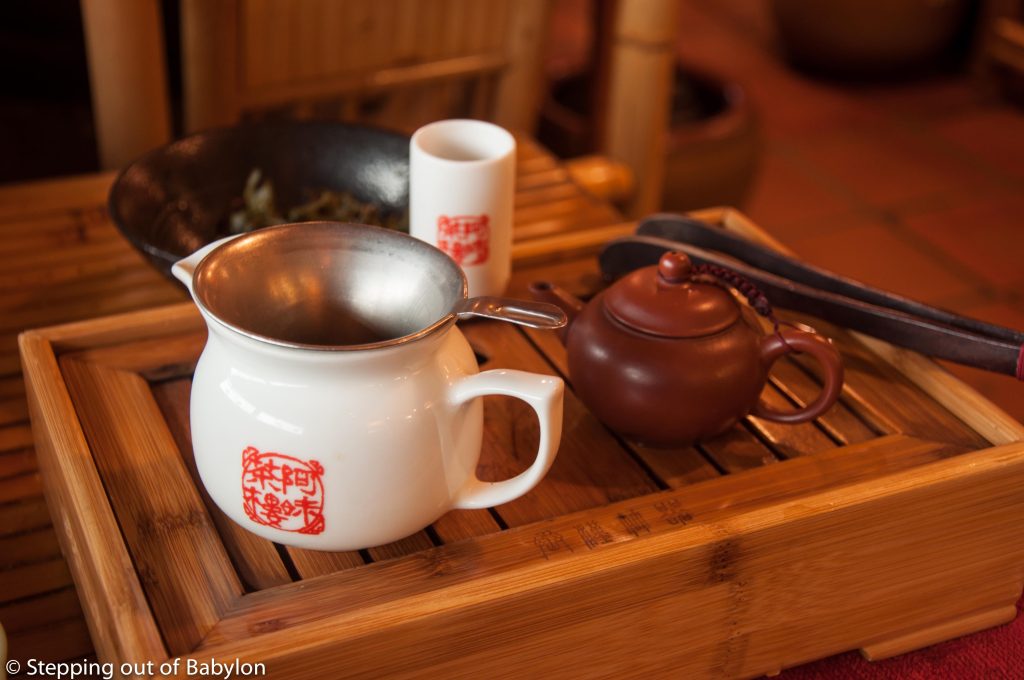
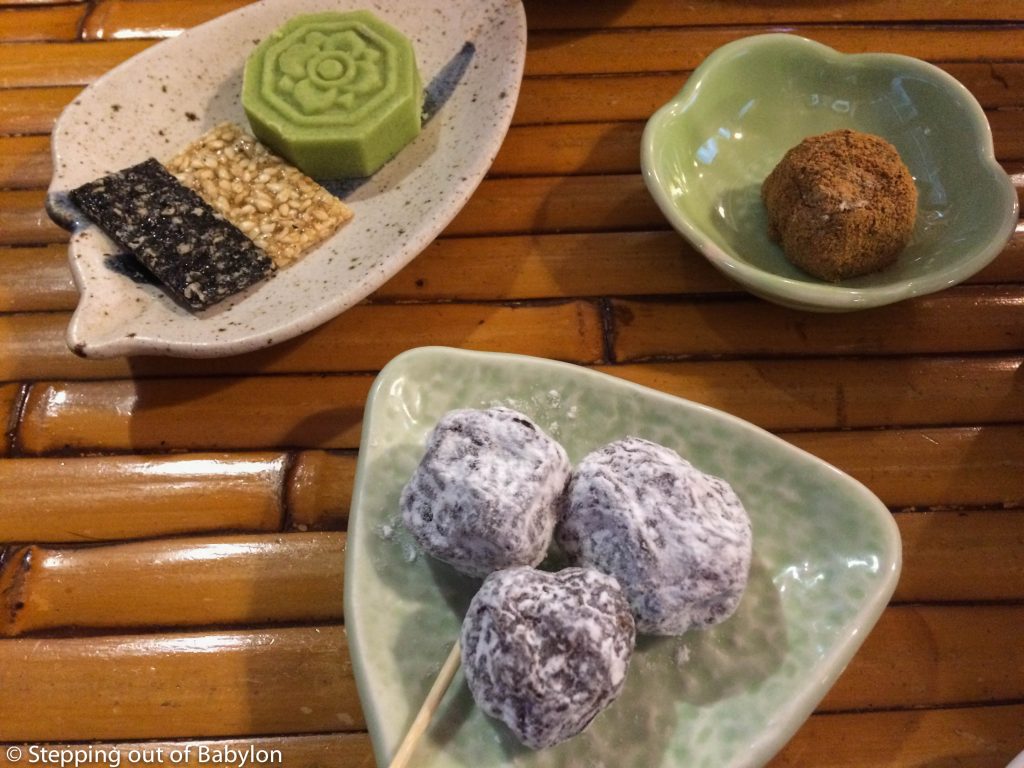
Where to Sleep in Jiufen
Most people visit Jiufen on a day trip from Taipei, but I chose to stay one night, as Jiufen was conveniently located along the route I had planned to follow down Taiwan’s East Coast.
I stayed at On My Way Jiufen Hostel, which has a great location—very close to both the main street and the bus stop. The hostel has a relaxed vibe, good facilities, and very friendly, helpful staff. The accommodations are simple, and while it covers all the basics, it lacks a bit in comfort—particularly when it comes to soundproofing.
Where to Eat in Jiufen:
Jiufen is well known for its beef noodle soup and other hearty meat dishes, but there’s much more to explore in terms of local snacks—both sweet and savory—with plenty of vegetarian options available. The best approach is to wander through Jiufen’s streets and stop at various stalls to sample the local specialties:
- Taro Balls: A chewy dessert made from a mix of taro, sweet potato, and beetroot—though the texture and taste don’t resemble the original vegetables much. Served with beans, it comes in two versions: cold and hot. I wasn’t a fan of either, but the cold version (served with ice) was slightly better, as the hot one tastes too much like bean soup. Try them at Grandma Lai’s Taro Balls, a traditional yet stylish shop located on the main street.
- Glutinous Rice Cakes: Another version of Taiwan’s beloved sticky rice sweets. These cakes are soft, slightly sweet, and filled with red bean paste (though meat-filled options also exist). They’re not extraordinary, but worth trying at Ah Lan Hakka, Jiufen’s most famous shop for freshly handmade rice cakes.
- Oil Onion Rice Cake: This dish resembles a white-colored pudding, often seen in large trays at restaurant entrances. It’s served cold, roughly cut into chunks, and topped with a sweet sauce. The cake itself has little flavor, but leaves a mild onion aftertaste.
- Stinky Tofu: Fermented tofu, usually deep-fried, known for its strong and distinctive smell that wafts through the streets. Despite its off-putting aroma, stinky tofu is surprisingly tasty and very popular in Taiwan, especially at night markets. Once you get past the smell, it’s definitely worth trying—and easy to find thanks to the unmistakable scent.

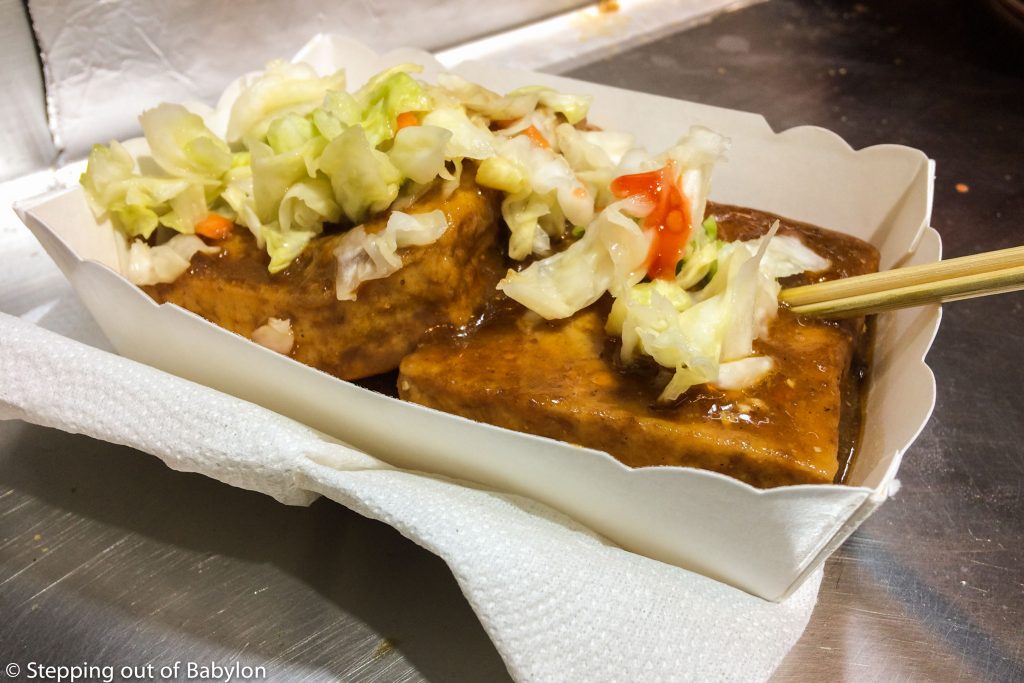
Besides these snacks, most restaurants in Jiufen focus on beef noodle soup and meatball noodle soup. Vegetarian options do exist—mainly fried noodles or noodle soups—but choices are limited.
Ask your hostel or guesthouse for a Jiufen map, which often highlights the locations of key restaurants, snack stalls, teahouses, and specialty shops.

How to Go from Taipei to Jiufen by Public Bus
Reaching Jiufen from Taipei is simple and affordable—you don’t need to join a tour. The public bus is the cheapest and most flexible option, allowing you to travel on your own schedule.
Take bus 1062 (operated by the Keelung Bus Company), which departs from Zhongxiao Fuxing MRT Station, Exit 2. The ride to Jiufen is smooth and comfortable.
- Frequency: Approximately every 20 minutes
- Operating Hours: 6:00 AM – 9:30 PM
- Duration: Just over 1 hour (depending on Taipei traffic)
- Fare: NT$100
